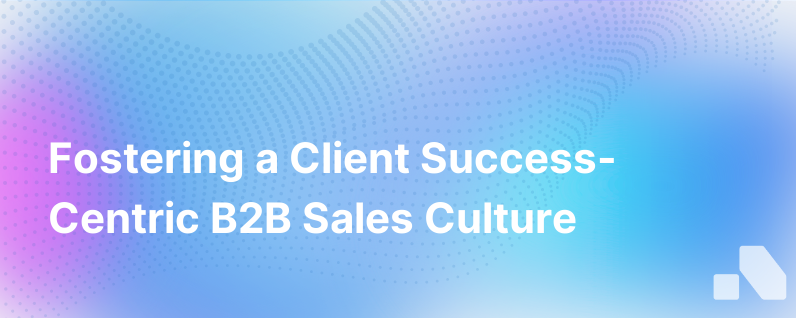Building a B2B Sales Culture Focused on Client Success
Published on December 16, 2023 by David Zhang
In today's competitive B2B landscape, the sales culture of an organization not only has to be robust but should also be centered on the linchpin of modern business: client success. It's a strategic transition from a volume-driven to a value-driven approach. This shift can be radical yet rewarding, leading to a significant impact on the company’s growth and sustainability.
The traditional methods of B2B sales primarily focused on the funnel's initial phase—acquisition. However, the contemporary model shifts that spotlight toward the end of the funnel—retention and expansion through stellar client success. Here’s how businesses can approach building a B2B sales culture focused on client success.
Create Purpose-Driven Sale Teams
Sale teams should transcend beyond mere transactions, evolving into advocates for client success. This transition involves a pivot in the sales approach. In place of the archetypical sales-driven scripts, reps are trained to understand deeper client needs, becoming problem-solvers and consultants.
Foster Communication and Teamwork
Encouraging cross-functional teamwork is the cornerstone for client success. Sales teams must work cohesively with product development, customer service, and marketing to understand and serve the client's comprehensive journey. Frequent communication and sharing success stories within the team can spark innovative ways to serve clients better.
Implement Continuous Training
B2B organizations must provide ongoing training—focusing not only on sales tactics but also on industry insights, product knowledge, and client relationship management. Tools and technologies are proliferating, and understanding their nuances can help teams articulate the actual value to the clients, therein boosting their success.
Invest in Robust Infrastructure
Leverage technology like sophisticated customer relationship management (CRM) systems, which can provide detailed insights into the client's behaviors, preferences, and interactions. By harnessing data analytics, machine learning, and artificial intelligence, sales teams can anticipate client needs and personalize their approach, driving client success.
Measure What Matters: Shifting KPIs
A client-centric sales culture must reevaluate its Key Performance Indicators (KPIs). Typical sales metrics like number of calls made, or deals closed, become secondary to client success indicators such as customer lifetime value (CLV), customer satisfaction scores (CSAT), Net Promoter Scores (NPS), churn rates, and upsell rates.
Reward and Recognition Aligned with Client Success
Incentive programs should reward those who contribute significantly to client success. Recognizing team members who have maintained long-term client relationships or have contributed to client growth can motivate others to follow suit.
Leadership Commitment
A shift in culture starts at the top. When leadership makes client success a priority—both in strategy and in practice—it sets a precedent throughout the organization. Leaders must be willing to reallocate resources, such as investing in client success teams and aligning compensation plans with client outcomes.
Analyze and Adapt
Continuous assessment of client success efforts is vital. Sales teams should regularly review their client engagement strategies to identify what's working and areas for improvement. This proactive posture ensures the sales process remains agile and can be adapted to changing client requirements or market conditions.
Celebratory Milestone
Celebrate every client success story. Each milestone achieved by clients, facilitated by your solution or service, should be recognized and celebrated. This not only motivates the team but also solidifies the importance of client success within the company’s ethos.
Personal Development Plans
Sales professionals should have personal development plans that align with client success objectives. Encouraging staff to pursue coursework and certifications can deepen their understanding of client success, bringing added value to their roles.
Conclusion
Navigating the shift from a traditional sales-oriented to a client success-focused culture does not happen overnight; it’s a strategic, persistent journey. However, B2B organizations that manage to focus their sales culture on client success often witness enhanced customer loyalty, increased revenue through upselling and cross-selling, and strong client advocacy—all instrumental in driving long-term business success.
For businesses like ours, that provide AI-driven tools for B2B sales, emphasizing client success is both a mission and a growth strategy. Our platform, Aomni, can help sales teams embrace this shift by streamlining access to real-time account information and insights, enabling sales teams to focus more on strategic client success efforts rather than administrative tasks. It's not just about selling a platform; it's about partnering with companies to ensure our mutual clients achieve their desired success.
Sources:
- Customer Success as a Culture — Best Practices to Build an Effective Customer Success Organization - ClientSuccess CSM Resources
- 5 Key Metrics to Measure the Success of Your B2B Sales Outreach
- Case study: Building a customer-centric B2B organization
- The Science of Measuring Customer Satisfaction in B2B Sales
- Customer Success as a Culture — Why the Importance of Customer Success is Immersed in the Fabric of Act-On - ClientSuccess CSM Resources
- How to build the best customer success team in 11 steps
- Building a Strong Customer Success Team: Strategies for Success
- Sales Culture: How to Build a High Performance, Healthy Sales Team